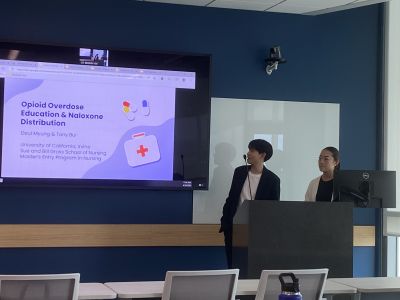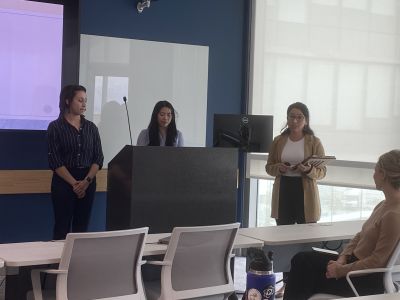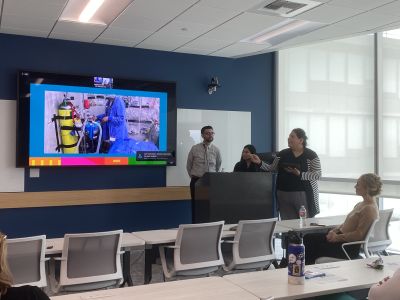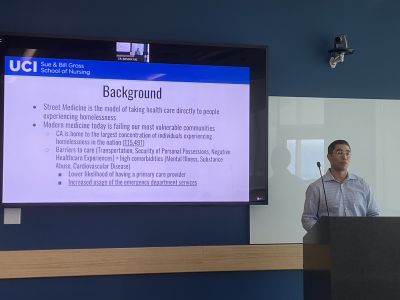Expanding the Impact of Nursing
The Leadership Project provides students with the opportunity to create new learning opportunities while delivering profound community impact.
By Nicholas Schou
In 2017, the Sue & Bill Gross School of Nursing added an important new dimension to its graduate studies when it instituted the Masters Entry Program in Nursing. The most important requirement of the program is the MEPN Leadership Project, in which participants both design and present to the nursing school a well-developed project that offers to broaden and enhance the nursing profession’s impact on the communities it serves.
Helping to oversee all the MEPN Leadership Projects is Stephanie Au, assistant clinical professor, who joined the nursing school faculty in 2018. “Innovation in nursing education at UCI means more than just acquiring clinical skills; it’s about cultivating leadership and a commitment to community well-being,” says Au.
From addressing the fentanyl crisis through the College of Health Studies’ student safety taskforce to inspiring tomorrow’s healthcare professionals via a new career pathways conference, these proposed projects highlight UCI’s commitment to innovative, impactful nursing education and community engagement. The Leadership Project is also a crucial chapter in the journey of nursing school graduates as they endeavor to make a lasting difference in healthcare and beyond.
 One of the most potentially impactful ideas to come out of the Leadership Project is the work of Deul Myung and Tony Bui. The pair hope to create an ‘Interprofessional Opioid Educational Seminar for UCI’ which would educate students on the dangers of opioids and distribute Narcan and provide training in its use for resident advisors. The seminar would include event booths and freshman orientation and maintain a long-term website with FAQs, while also expanding to other college universities, thus providing a significant contribution to combatting the national opioid crisis, which has caused numerous overdoses on college campuses in the United States.
One of the most potentially impactful ideas to come out of the Leadership Project is the work of Deul Myung and Tony Bui. The pair hope to create an ‘Interprofessional Opioid Educational Seminar for UCI’ which would educate students on the dangers of opioids and distribute Narcan and provide training in its use for resident advisors. The seminar would include event booths and freshman orientation and maintain a long-term website with FAQs, while also expanding to other college universities, thus providing a significant contribution to combatting the national opioid crisis, which has caused numerous overdoses on college campuses in the United States.
“During my college years, I encountered numerous instances where people I knew and cared about tragically lost their lives to drug use,” says Myung. “These experiences have had a profound impact on my life, motivating me to take action and address this issue before more lives are lost to substance abuse.”
Myung sees the proposed seminar as a harm reduction program. “Students will learn the harmful effects of opioids on the body, how to recognize the signs and symptoms of an opioid overdose, how to provide those pre-hospital emergency interventions, and how to administer Naloxone, and how to access tested and reversal agents like Naloxone within their community.”
Statistics show that the opioid crisis shows no signs of slowing down. According to the most recent report from the Orange County Healthcare Agency, from 2019 to 2020, the number of deaths from drugs and alcohol increased by 150%. In Orange County, opioid overdose is the leading cause of fatality among residents between18 and 24 of years of age., and opioids being the leading cause of drug related overdose deaths. Ninety-eight percent of those deaths were from Fentanyl overdoses. In 2021, county officials reported 78 reported overdose deaths, a 550% increase from the 12 deaths reported in 2017.
“We hope that we can make Narcan training a required course for UCI resident advisors,” says Bui. “And as we expand, we anticipate developing other chapters across different universities.’ According to Bui, the project has already received strong support from Dr. Arianna Nelson from School of Medicine, Dr. Erin Knox and Dr. Farrah Khorassani from the School of Pharmacy, Dr. David Timberlake from the School of Public Health, as well as Au.
 Another important project, ‘Improving Educational Pathways for High School Students Interested in Healthcare Professions,’ is the work of Santana Rodriguez, Brianna Brooks, and Julia Fong. The trio aims to provide guidance to high school students interested in healthcare careers via resources such as infographics, a YouTube video, and a podcast series. Their long-term goal includes promoting diversity in the healthcare workforce and addressing stereotypes while reaching out to underrepresented students.
Another important project, ‘Improving Educational Pathways for High School Students Interested in Healthcare Professions,’ is the work of Santana Rodriguez, Brianna Brooks, and Julia Fong. The trio aims to provide guidance to high school students interested in healthcare careers via resources such as infographics, a YouTube video, and a podcast series. Their long-term goal includes promoting diversity in the healthcare workforce and addressing stereotypes while reaching out to underrepresented students.
“We want to send out a survey to the incoming or new school of nursing students to get an idea of what their needs are and to gauge their knowledge gaps in being a nurse and how to survive nursing school,” explains Fong. “We want to make sure that we cater to their needs as they’re just embarking on the program, and really emphasize the vast, endless opportunities that nursing can afford you.”
Similarly, another project, ‘Improving Student Learning Experiences Through Medical Mission Partnerships,’ aims to enhance the nursing school program by providing students with valuable experience and leadership skills through medical missions, particularly reconstructive surgeries for children in Mexico. Created by Viviana G
arnica, Norma Montana, and Teymour Mushfiq, the project seeks to provide compassionate community-based healthcare at the same time as giving students valuable cultural context in their training as nursing professionals.

The envisioned project is currently scheduled to involve three trips per year. “Our mission is to provide compassionate community-based healthcare through reconstructive surgery for the pediatric population,” says Garnica. “We want to offer nursing students a unique opportunity to collaborate with a multidisciplinary team in a different cultural setting.”
Meanwhile, a fourth proposed project aims to address the stigma and lack of education surrounding healthcare for sex workers: ‘Breaking the Stigma for Sex Workers using High Fidelity Simulation Cases in Nursing Education.’ The brainchild of Cody Jose, it would create simulation cases to train healthcare providers in responding to the needs of sex workers, thus promoting more inclusive healthcare. Jose also intends to involve practicing nurses and assess the impact of education on their performance. The project is set to start in Spring/Fall of 2024.
“I’ve dedicated my study abroad experience to understanding sex work in the Netherlands,” recounts Jose. “Sex trafficking is based upon the abuse of power that leads to a negation of agency and autonomy. In an attempt to shift to an inclusive narrative and have future nurses really become a part of the solution, I seek to implement a sex work-based simulation that not only attempts to expel misconceptions and potential biases also helps nursing students gain the necessary skills to adequately respond to their needs, so that ultimately, sex workers feel like they are deserving of care and to be treated with dignity as individuals.”
Finally, MEPN student Andrew Jaime is leading a project that aims to take medical care directly to homeless populations on the streets of Los Angeles.

‘Developing an Interprofessional Street Medicine Clinical Rotation for the Homeless’ would partner UCI with USC to create a street medicine program and integrate it into both schools’ curriculum. The project is targeting a 2024-25 academic calendar start date.
“Street medicine is the model of taking healthcare directly to people experiencing homelessness out on the streets,” Jaime explains. “The problem today is that modern medicine is failing our most vulnerable communities, as evidenced by California having the largest concentration of individuals experiencing homelessness in the nation, with over 115,000 people displaced onto the streets.”
According to Jaime, the project would work to bring student nurses into “classrooms without walls” to further their education beyond scenario-based simulations and acute hospital settings, thus furthering the school of nursing’s mission of promoting community and population health. “As a school, UCI will help combat the shortcomings of modern healthcare by extending a fundamental human right of equal access to healthcare for all,” says Jaime, “thus promoting the quality of life and overall health outcomes of our most vulnerable populations.”
“Through projects like these, our nursing students are gaining the collaborative spirit behind the MEPN Leadership Project and exemplifying the university’s commitment to shaping compassionate, skilled, and visionary nursing leaders.
